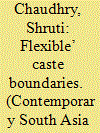|
|
|
Sort Order |
|
|
|
Items / Page
|
|
|
|
|
|
|
| Srl | Item |
| 1 |
ID:
167245


|
|
|
|
|
| Summary/Abstract |
Based on ethnographic fieldwork in a village in the north Indian state of Uttar Pradesh, this article focuses on cross-regional marriage (those that cross caste and linguistic boundaries and entail long-distance migration) as mixed marriage. It queries the ‘acceptance’ of women sought beyond traditional boundaries of caste in a context where caste endogamy is the norm and breaches are otherwise not tolerated. It argues that while the caste of the women is overlooked when the alliance is made, their caste does not cease to be a concern in the caste-bound rural communities into which they marry. A discourse of caste, centred on food transactions, derogatory remarks about skin colour and in the refusal to marry the children of cross-regional couples, serves to mark difference and make claims to status. While there has been a decline in certain exclusionary caste practices in the village, a sense of hierarchy is retained.
|
|
|
|
|
|
|
|
|
|
|
|
|
|
|
|
| 2 |
ID:
167937


|
|
|
|
|
| Summary/Abstract |
Based on ethnographic fieldwork in rural Uttar Pradesh, this article contributes to debates on married women's relations with their natal kin. It compares women in ‘regional’ marriages (which conform to caste and community norms with a relatively small marriage distance) with women in ‘cross-regional’ marriages (those that cross caste, linguistic, and state boundaries, and entail long-distance migration). A focus on cross-regional marriage demonstrates how geographic distance cuts women off from vital structures of support. At the same time, even for regional brides, natal kin support is complicated and relative proximity does not guarantee support. Factors such as caste, class, poverty, the gender of children, notions of honour and shame, and stage in the life-course work together in complex ways to determine the duration and kind of support available. By focusing on marital violence, marital breakdown, and widowhood, the article demonstrates both the presence and the limits of natal kin support. The opportunities to draw on natal kin support vary for women, but its significance must not be understated as it alone provides women with the possibility of leaving their marriages, even if only temporarily. The article focuses on one form of women's agency, one that is constrained and highly dependent on relationships with others (mainly male kin). In such a context of economic and social dependency, natal kin support is an important—and perhaps the only—resource available in situations of marital crisis, and its absence leaves women in a particularly vulnerable position.
|
|
|
|
|
|
|
|
|
|
|
|
|
|
|
|
|
|
|
|
|